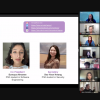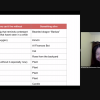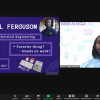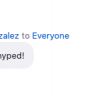Privacy and IoT Workshop Offers Opportunities for Underrepresented Undergrads
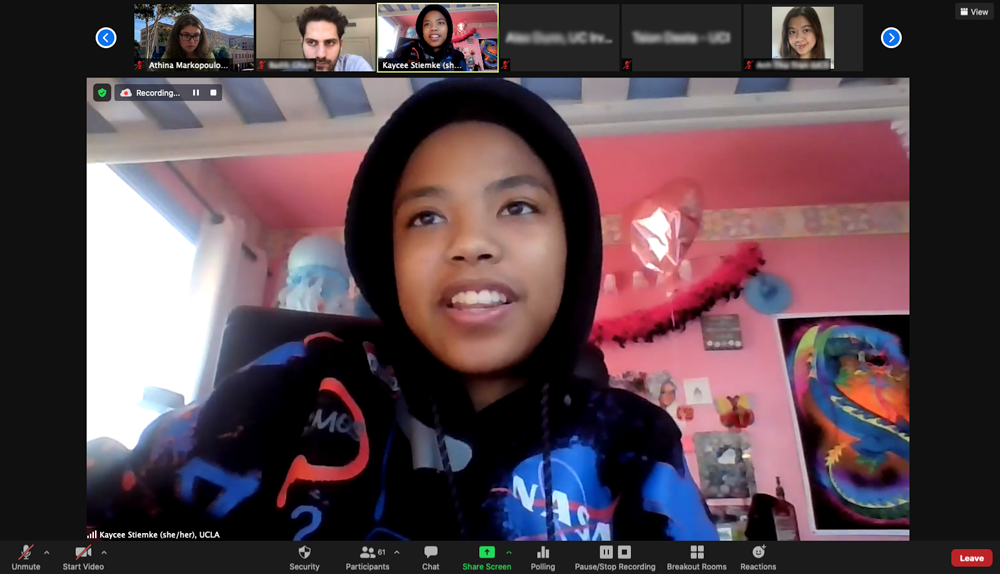
June 1, 2021 – Around 60 undergraduate students from underrepresented communities around the country learned about cybersecurity research at the “Research Exploration Workshop on IoT and Privacy” held virtually May 8-22, 2021.
Conducted by the UC Irvine Stacey Nicholas Office of Access and Inclusion, the new outreach workshop was co-sponsored by a competitive Google exploreCSR (computer science research) award and UCI’s new NSF-funded ProperData center. Its goal was to encourage students from underrepresented groups to pursue graduate studies and research careers in computing. These groups include women, Latinx, African Americans, Native Americans, persons with disabilities and those from socioeconomically disadvantaged backgrounds.
Sharnnia Artis, assistant dean for access and inclusion and director of the Stacey Nicholas Office of Access and Inclusion, and Athina Markopoulou, Samueli School professor and chair of the Department of Electrical Engineering and Computer Science, co-organized the effort.
“There is an urgent need for opportunities to attract and retain a critical mass of women and Black, Indigenous and people of color (BIPOC) in computing research,” said Artis. “The purpose of the workshop is to introduce students to Internet of Things (IoT) and privacy research, provide them hands-on experience through projects, and expand their network by connecting them with faculty, graduate students and STEM professionals in computing.”
The participants, selected from more than 200 applicants, learned about cutting-edge research on privacy, gained experience using Raspberry Pi and Python, and listened to panelists of industry leaders from Google and faculty from community colleges and four institutions: UCI, UC Davis, USC and Northeastern University.
“It was rewarding to work with this cohort of students,” noted Markopoulou. “We hope to continue to engage them in research on privacy and security in the future, through undergraduate research, mentoring and professional development opportunities. I would personally like to see several of them apply to graduate school.”
Participants were mentored by faculty and graduate students from the ProperData Center, directed by Markopoulou. One such mentor was Evita Bakopoulou, a graduate student in networked systems and founding president of Women in CyberSecurity Student Chapter at UCI (WiCyS), which promotes women’s education, participation and leadership in cybersecurity. She noticed the students were highly engaged during the workshop, especially during a virtual scavenger hunt. “They were very creative and social/friendly to each other,” she said. “In the technical sessions, they seemed to be very interested in privacy and how computer networks work by asking the right questions. Some of the questions they explored are currently being considered by researchers in the field.”
A graduate student panel offered firsthand information about graduate school, its challenges and how much people can grow in the process. Participants asked for advice on how to get accepted, read papers efficiently and whether it is better to do a master's before a doctorate and more.
“We were extremely fortunate to have undergraduate and graduate students to serve as tech mentors in this program,” Artis explained. “The near-peer mentorship really helps participants envision pathways for their future. I hope they walked away with knowledge about computing research in IoT and privacy, how to get involved in computing research, and a community of support as they pursue their careers in computing.”
Markopoulou added that OAI was critical to the event: “OAI is a true asset to UCI. We wouldn’t be able to launch such events without the experience and infrastructure provided by Sharnnia and her team. The workshop program was split between technical hands-on experience and career advice from researchers at different levels of their careers. I particularly appreciated the enthusiasm and volunteering of our graduate students, especially the WiCys members and OAI ‘graduates,’ who helped run the workshop and created a blueprint for future such events.”
According to student feedback, the workshop was successful. Here are a few of the comments.
“My favorite part of this whole workshop was learning about the different experiences of the panelists and the graduate students. It gave me a better sense of what obtaining a graduate degree would be like and what it entails.” – Ani Magerdichian, UCI
“My favorite part of the program was the hands-on experience and receiving a refresher on cybersecurity to care more about data collection.” – Abel Agular, USC
“I really appreciated how accessible this workshop was. You know, I never really felt like I truly fit into CS. I just learned so much more about graduate school. It was kind of on my radar, but not really, and I’m thinking about it a little bit more now. So I want to thank everyone for the panels and all the information.” – Alison Gridley, UCI
“It was nice to hear from people [grad panel] who weren’t necessarily confident pursuing computer science, but did it anyway despite feeling discouraged. That is something that resonates with me right now as I take computer science classes because I do feel discouraged sometimes.” – Kaycee Stiemke, UCLA
“What I liked most was actually meeting everyone because it’s kind of rare that you have a ton of people interested in security, all in one space. One thing I learned was that having or working toward a Ph.D. is a prerequisite for research positions and most companies...that puts things into consideration whether I want to make that decision later on in life.” – Emily Gao, Northeastern University
“The most important aspect of this program was that it opened my eyes to the possibility of graduate school and doing a Ph.D. Previous to this, I had never really seen myself going for a Ph.D. I never had the opportunity to sit down, talk and listen to people share their experiences of earning a doctorate.” – Osbaldo Gonzalez, Pasadena City College
– Tonya Becerra

